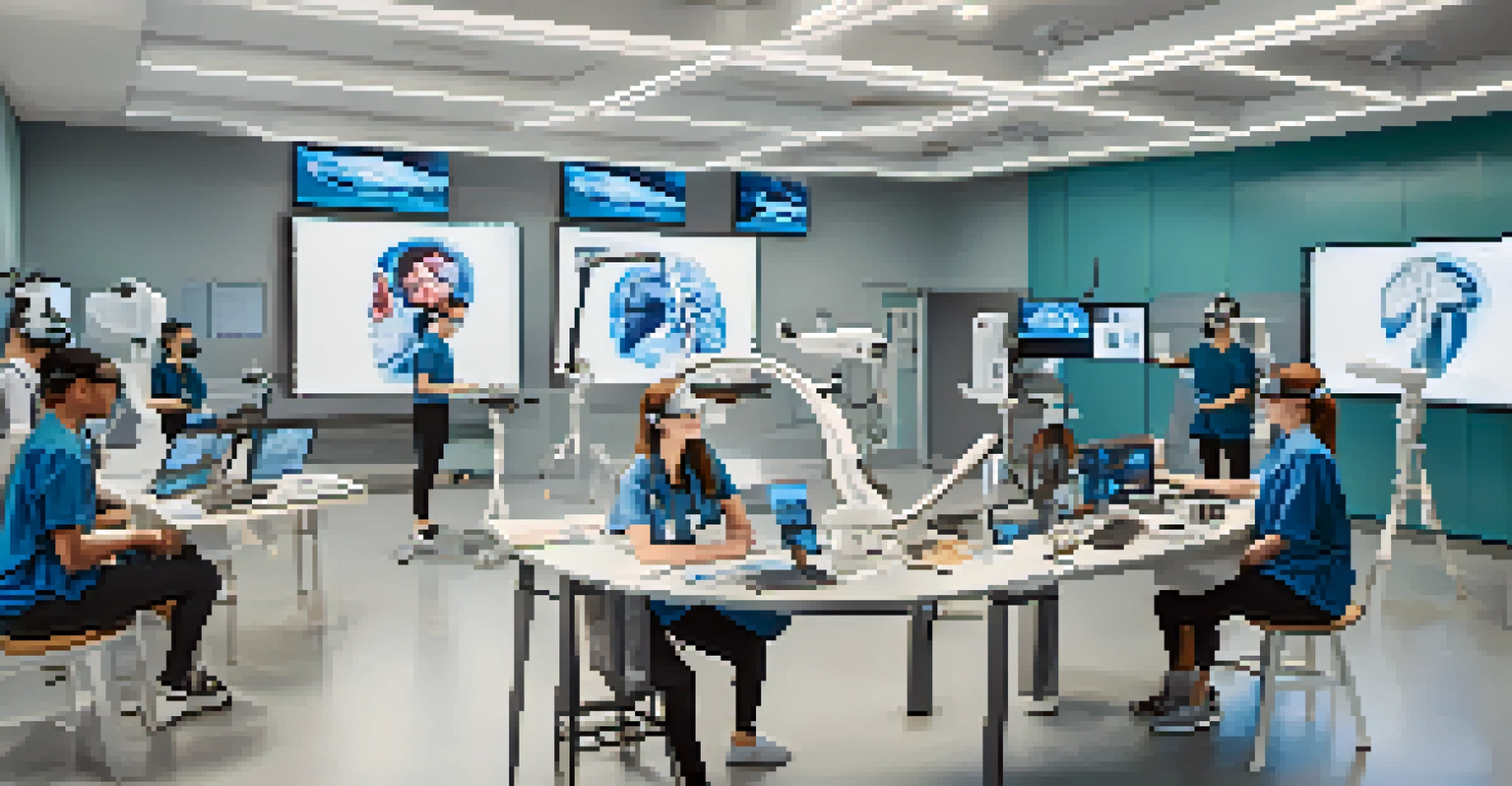The Role of Technology in Research at UW and Seattle Institutions

Introduction: The Intersection of Technology and Research
In today's fast-paced world, technology is reshaping how research is conducted, particularly at the University of Washington (UW) and other Seattle institutions. This intersection of technology and research opens doors to innovative methodologies, data analysis, and collaboration opportunities. By leveraging advanced tools and platforms, researchers can tackle complex problems more effectively than ever before.
The greatest danger in times of turbulence is not the turbulence; it is to act with yesterday's logic.
The role of technology goes beyond just using computers and software; it encompasses a wide range of tools, including artificial intelligence, big data analytics, and cloud computing. These advancements allow researchers to analyze vast amounts of data, generating insights that were previously unattainable. As a result, the research community can respond more swiftly to emerging challenges.
Moreover, this technological evolution fosters interdisciplinary collaboration, enabling researchers from diverse fields to come together. By sharing their expertise and resources, they can create more comprehensive solutions to pressing issues. In the following sections, we will delve deeper into specific technologies and their transformative impacts on research.
Big Data: Unlocking New Insights in Research
Big data refers to the massive volumes of data generated every second, and analyzing this information can lead to groundbreaking discoveries. At UW and other Seattle institutions, researchers are increasingly utilizing big data analytics to uncover trends and patterns that inform their studies. Whether in healthcare, environmental science, or social research, big data provides a wealth of information that drives innovation.

For instance, in the field of public health, researchers can analyze data from various sources—like social media, health records, and environmental sensors—to identify disease outbreaks and health trends. This capability not only enhances the speed of response but also improves the accuracy of predictions and interventions. It's a powerful example of how data-driven insights can lead to better outcomes.
Technology Transforms Research Methods
Advancements like big data, AI, and cloud computing are reshaping how researchers at UW and Seattle institutions approach complex problems.
Moreover, big data tools facilitate collaboration among researchers by allowing them to share large datasets across disciplines. This collaborative approach enhances the quality and scope of research, as teams can draw on diverse expertise to tackle multifaceted problems. The potential of big data in research at UW and Seattle institutions is vast and continually evolving.
Artificial Intelligence: A Game Changer for Research
Artificial intelligence (AI) is revolutionizing the research landscape, enabling researchers to automate tasks and analyze complex data with unprecedented speed and accuracy. At UW, AI tools assist in everything from data collection to predictive modeling, freeing researchers to focus on creative problem-solving. For example, AI algorithms can quickly sift through thousands of research papers, identifying relevant studies and findings.
Technology is best when it brings people together.
In addition to processing data, AI can also enhance the research process by offering predictive insights. In fields like climate science, AI models can simulate various scenarios, helping researchers understand potential outcomes and impacts. This capability allows for more informed decision-making and strategic planning when addressing critical issues.
Furthermore, the integration of AI fosters innovation by inspiring new research questions and methodologies. As researchers experiment with AI technologies, they often discover novel approaches that challenge traditional paradigms. The synergy between AI and research is not just a trend; it's a fundamental shift that promises to enhance the quality and efficiency of scientific inquiry.
Cloud Computing: Enhancing Collaboration and Access
Cloud computing has transformed how researchers store and share data, offering a flexible and scalable solution for research needs. At UW and Seattle institutions, cloud platforms enable researchers to access vast resources without the burden of maintaining physical servers. This accessibility encourages collaboration, as teams can work together seamlessly, regardless of their physical location.
With cloud computing, researchers can easily share large datasets and computational resources, breaking down barriers that often hinder collaboration. For example, a team studying urban development can simultaneously analyze data from different cities, leading to richer insights and comparative studies. This collaborative spirit enhances the quality of research outcomes.
Collaboration Enhanced by Digital Tools
Cloud computing and digital tools enable seamless collaboration among researchers, allowing diverse teams to work together more effectively.
Moreover, cloud platforms often come equipped with advanced tools for data analysis, enabling researchers to conduct complex computations without needing specialized hardware. This democratizes access to cutting-edge technology, allowing more researchers to engage in high-level analysis and exploration. As cloud computing continues to evolve, its role in research will only grow more significant.
Digital Tools: Streamlining Research Processes
Digital tools play a crucial role in streamlining various aspects of research, from project management to data collection. Researchers at UW and Seattle institutions utilize software applications that facilitate collaboration, track project progress, and organize research findings efficiently. These tools not only save time but also enhance productivity, allowing teams to focus on their core research objectives.
For instance, project management platforms help researchers coordinate tasks, assign responsibilities, and set deadlines, ensuring that everyone is on the same page. This organized approach minimizes confusion and maximizes efficiency, which is especially valuable in large, multidisciplinary projects. As a result, research teams can produce higher-quality work in less time.
Additionally, digital tools for data collection, such as online surveys and mobile applications, enable researchers to gather information quickly and accurately. These tools provide real-time data entry and analysis, making it easier to adapt research methodologies as needed. By embracing digital tools, researchers can remain agile and responsive to the dynamic nature of their disciplines.
Virtual Reality: Expanding Research Horizons
Virtual reality (VR) technology is not just for gaming; it's making significant inroads into research at UW and other Seattle institutions. Researchers are using VR to create immersive environments that allow for unique experimentation and exploration. For example, in psychology, VR can simulate real-world scenarios to study human behavior in controlled settings.
One of the most exciting applications of VR in research is in the field of medicine. Medical students can practice surgical procedures in a virtual environment, honing their skills without the risks associated with real-life surgeries. This hands-on experience enhances learning outcomes and prepares students for real-world challenges, showcasing the potential of VR as a training tool.
Ethics in Tech-Driven Research
As technology becomes integral to research, ethical considerations such as data privacy and fairness in AI usage are vital for maintaining integrity.
Moreover, VR fosters a new level of engagement in research presentations and findings. Researchers can use VR to create interactive visualizations of their work, allowing audiences to experience their research in a more profound way. This innovative approach not only captures attention but also enhances understanding, making research more accessible and impactful.
Ethical Considerations: Navigating the Tech-Driven Landscape
As technology continues to permeate research, ethical considerations become increasingly important. Researchers at UW and Seattle institutions must navigate issues such as data privacy, consent, and the implications of using AI. Ensuring that technology is employed responsibly is crucial to maintaining public trust and upholding the integrity of research.
For example, when utilizing big data, researchers must carefully consider how to protect sensitive information. Strategies such as anonymization and secure data storage are essential to mitigate risks associated with data breaches. By prioritizing ethical practices, researchers can uphold the rights of individuals while still harnessing the power of technology.

Additionally, discussions around the ethical use of AI should continue to evolve as the technology develops. Researchers must remain vigilant about potential biases in AI algorithms and strive for fairness in their applications. By addressing these ethical challenges head-on, the research community can ensure that technology serves the greater good and contributes positively to society.
Conclusion: Embracing Technology for Future Research
In conclusion, technology is playing an increasingly vital role in research at UW and Seattle institutions, driving innovation and enhancing collaboration. As researchers continue to embrace tools like big data, AI, and cloud computing, they are better equipped to tackle complex problems and push the boundaries of knowledge. The synergy between technology and research promises to yield groundbreaking discoveries that can shape our future.
Furthermore, the integration of digital tools and VR is transforming how researchers engage with their work and share findings. By making research more interactive and accessible, technology fosters a deeper connection between researchers and the communities they serve. This engagement is vital for addressing societal challenges and ensuring that research has a meaningful impact.
Ultimately, as we navigate the ever-evolving landscape of technology, researchers must remain committed to ethical practices and responsible innovation. By doing so, they can harness the full potential of technology while upholding the principles that underpin scientific inquiry. The future of research is bright, and technology will undoubtedly play a central role in shaping it.